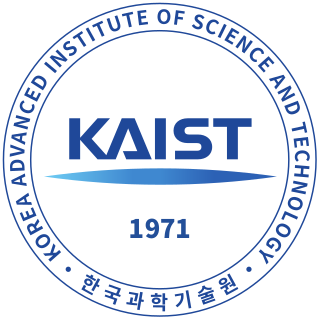
The Korea Advanced Institute of Science and Technology (KAIST) is a national research university located in Daedeok Innopolis, Daejeon, South Korea. KAIST was established by the Korean government in 1971 as the nation's first public, research-oriented science and engineering institution. KAIST is considered to be one of the most prestigious universities in the nation. KAIST has been internationally accredited in business education, and hosting the Secretariat of AAPBS. KAIST has 10,504 full-time students and 1,342 faculty researchers and had a total budget of US$765 million in 2013, of which US$459 million was from research contracts.

Seoul National University is a national research university located in Seoul, South Korea. It is one of the flagship Korean national universities.
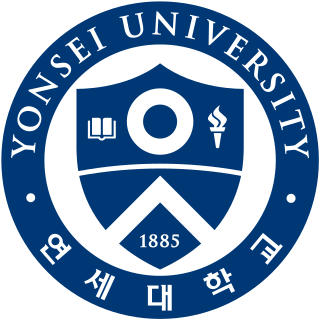
Yonsei University is a private research university in Seoul, South Korea. As a member of the "SKY" universities, Yonsei University is deemed one of the three most prestigious institutions in the country. It is particularly respected in the studies of medicine and business administration.

Hankuk University of Foreign Studies is a private research university based in Seoul, in South Korea. HUFS currently teaches 45 foreign languages. In addition, it contains studies in humanities, law, social sciences, business, medical science, natural sciences, and engineering.

The Catholic University of Korea is a private Roman Catholic institution of higher education in South Korea. It was established in 1855. The Catholic University of Korea operates campuses in Seoul and in the neighboring Bucheon City. The university's medical school, considered one of the most prestigious in South Korea, has eight affiliated hospitals in major cities of the country.

Korea University is a private research university in Seoul, South Korea. As one of the SKY universities, it is one of the oldest and most prestigious universities in the country. For the past 5 years, it has consecutively been ranked as one of the top 100 universities in the world by the QS World University Rankings.
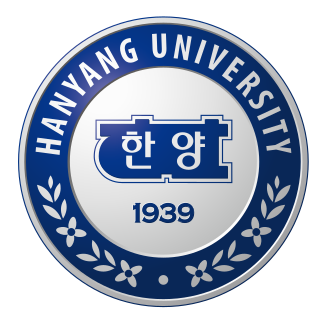
Hanyang University is a private research university in South Korea. The main campus is located in Seoul and its satellite campus, the Education Research Industry Cluster, is in Ansan. Hanyang derives from the former name of the capital Seoul used during the Joseon Dynasty. The university was established in 1939 as an engineering school. Hanyang university was the country's first college to offer engineering and architecture programs, and is consistently ranked among the leading universities in STEM fields nationally. Hanyang University enrolls over 3,000 international students each year, and sends more than 3,300 students on study abroad programs annually. As of 2018, Hanyang University had 777 partner universities in 76 countries.
Seoul Science High School for Gifted Students is an academy for gifted students interested in science. The school was established in 1989, and is located at Jongno-gu, Seoul. It was established as one of the 'Science High Schools' in Republic of Korea. In 2009, it has become an 'Academy for Gifted Students' selected by the Ministry of Education of Korea. Now, it is one of the eight such academies in Republic of Korea.

Hongik University is a private university in Seoul, South Korea. Founded by an independence activist in 1946, the university is located in Mapo-gu district of central Seoul, South Korea with a second campus(branch campus) in Sejong. In addition, Hongik University(Seoul campus) is one of the top universities in Korea.

SK hynix Inc. is a South Korean memory semiconductor supplier of dynamic random-access memory (DRAM) chips and flash memory chips. Hynix is the world's second-largest memory chipmaker and the world's 3rd-largest semiconductor company. Founded as Hyundai Electronic Industrial Co., Ltd. in 1983 and known as Hyundai Electronics, the company has manufacturing sites in Korea, the United States, China and Taiwan. In 2012, when SK Telecom became its major shareholder, Hynix merged to SK Group.

Kookmin University is the first private university after the liberation of the Republic of Korea from Japan. The campus is located in Seongbuk-gu, Seoul, South Korea. The KMU was established in 1946. Gu kim, Soang Jo and Ikhee Shin, who were the cabinet members of the Provisional Government of the Republic of Korea, agreed to train great leaders for the Republic of Korea. Soon, they became the banner of Kookmin University. Ikhee Shin contributed to play a key role in its foundation and was inaugurated as the First President of the University.
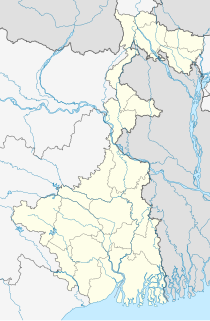
Bidhannagar College in Bidhannagar, Kolkata, established on 25 June 1984, is a West Bengal State University affiliated college run by the Government of West Bengal. It was formerly affiliated to the University of Calcutta. Apart from undergraduate courses, the college offers postgraduate courses in anthropology, botany, chemistry, education, microbiology and zoology.

Incheon National University (INU), previously also known as University of Incheon (UI), is a national university, operated by the legal entity established by the government of Republic of Korea. INU campuses are located at multiple locations in the city of Incheon, part of Seoul Capital Area.
Chey Tae-won is a South Korean business magnate. He is the chairman of SK Group, Korea's third largest Chaebol that mainly engages in oil, telecom, semiconductors, and chemical businesses. SK Group has 143 subsidiaries including SK Telecom, SK Hynix, and SK Innovation through SK Holdings. Chey is well known for the group's SK Hynix merger deal, which eventually becomes the world fourth largest chipmaker behind Samsung Electronics, Intel, and TSMC. As of June 2021, he is the 14th richest person in South Korea with an estimated net worth of US$3.6 billion. The bulk of his fortune comes from SK Holdings, holding company of SK Group.
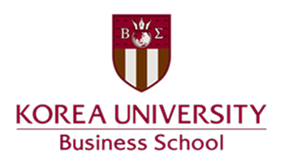
Korea University Business School is the business school of Korea University in Seoul, South Korea. KUBS was the first university department in Korea not only to open its doors to business studies but also to introduce western-style business studies to Korea. The school offers an undergraduate program, full-time and part-time MBA programs, MS/PhD programs, as well as few other non-degree programs. KUBS received Korea's first accreditation from AACSB in 2005 and EQUIS in 2007, respectively.

Seoul National University of Science and Technology is a national university located in Nowon-gu, Seoul, South Korea.

Institute of Natural Science (INS) is a university located inside the region of the National Academy of Science in Pyongyang, North Korea. INS is geographically located in Pyongsong, North Pyong'an Province, North Korea. However, North Korean government appointed the area of science district to belong to Pyongyang for giving some privileges of Pyongyang citizens to scientists of NAS and students of INS. As Kim Il-sung, a former leader of North Korea, emphasized the significance of education for gifted and talented students, INS originally started as a branch of Kim Il-sung University on January 17, 1962. It was separated from Kim Il-sung University in 1985. In North Korea, this university is known as "Sujae Daehark ". In South Korean mass media, this university is called "KAIST of North Korea". Top students of natural sciences or engineering in North Korea study at this university supported totally by North Korean government. Eighty percent of them is graduated from No.1 Middle Schools, which are science high schools for gifted and talented students in North Korea, and the rest twenty percent are medal winners in the national science olympiads or national science quiz contests. Unlike other universities in North Korea, students entering UNS have age limit. Equal or younger than 17 people are eligible to take entrance exam for UNS. It is known that many alumni of this university are involved in projects for developing missiles and launching artificial earth satellites.
The College of Science at Virginia Tech contains academic programs in eight departments: biology, chemistry, economics, geosciences, mathematics, physics, psychology, and statistics, as well as programs in the School of Neuroscience, the Academy of Integrated Science, and founded in 2020, an Academy of Data Science. For the 2018-209 academic year, the College of Science consisted of 419 faculty members, and 4,305 students, and 600 graduate students The college was established in July 2003 after university restructuring split the College of Arts and Sciences, established in 1963, into two distinct colleges. Lay Nam Chang served as founding dean of the College of Science from 2003 until 2016. In 2016, Sally C. Morton was named dean of the College of Science. Morton served in that role until January 2021, when she departed for Arizona State University and Ronald D. Fricker—senior associate dean and professor in the Department of Statistics—was named interim dean of the College.
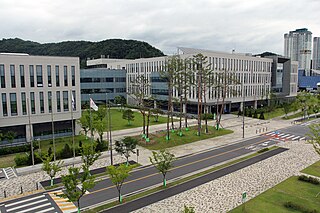
The Institute for Basic Science is a Korean government-funded research institute that conducts basic science research and relevant pure basic research. IBS was established in November 2011 by the Lee Myung-bak administration as a research institute, later be a core of the International Science and Business Belt (ISBB) upon relocation of their headquarters from a rented property to their own campus in January 2018 using land reclaimed from the Taejŏn Expo '93 in Expo Science Park. Comprising 30 research centers with 68 research groups across the nation and a headquarters in Daejeon, IBS has approximately 1,800 researchers and doctoral course students. Around 30% of the researchers are from countries outside of South Korea. The organization is under the Ministry of Science and ICT.
















